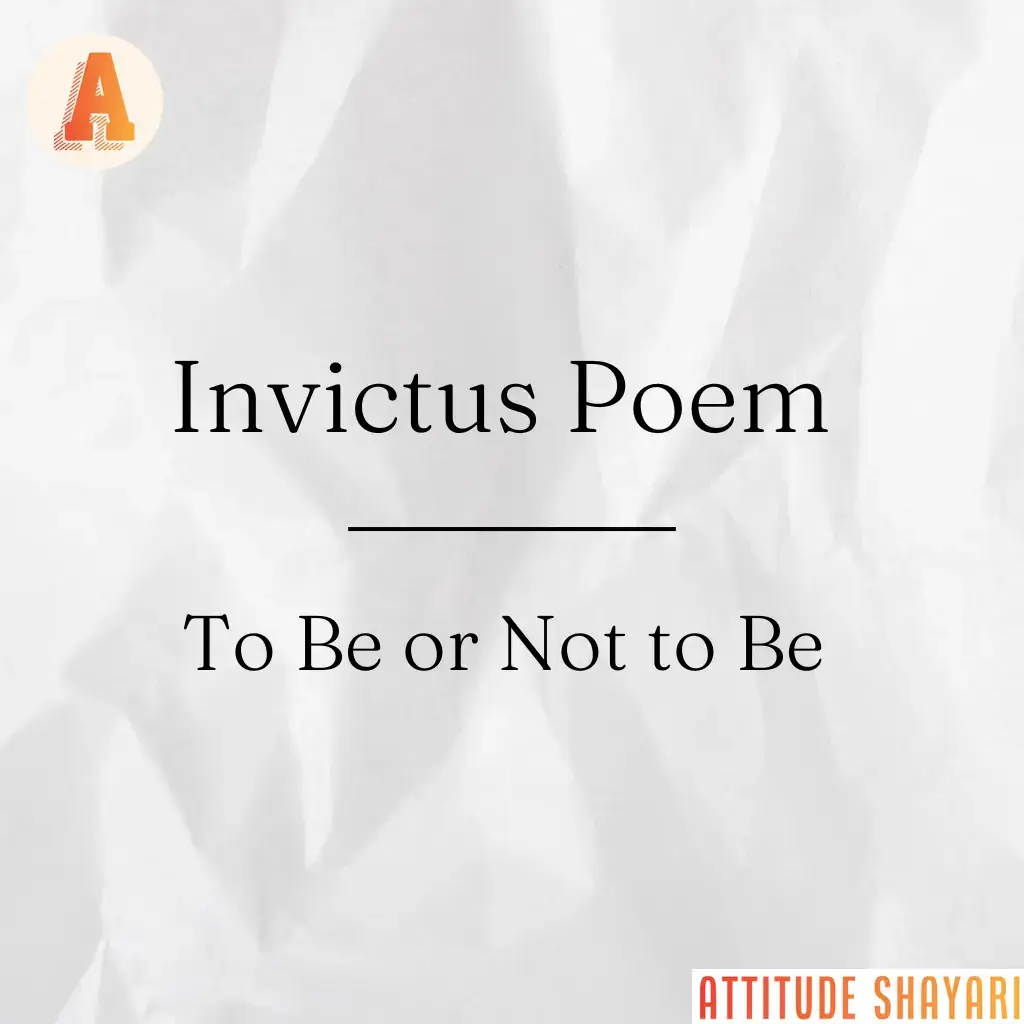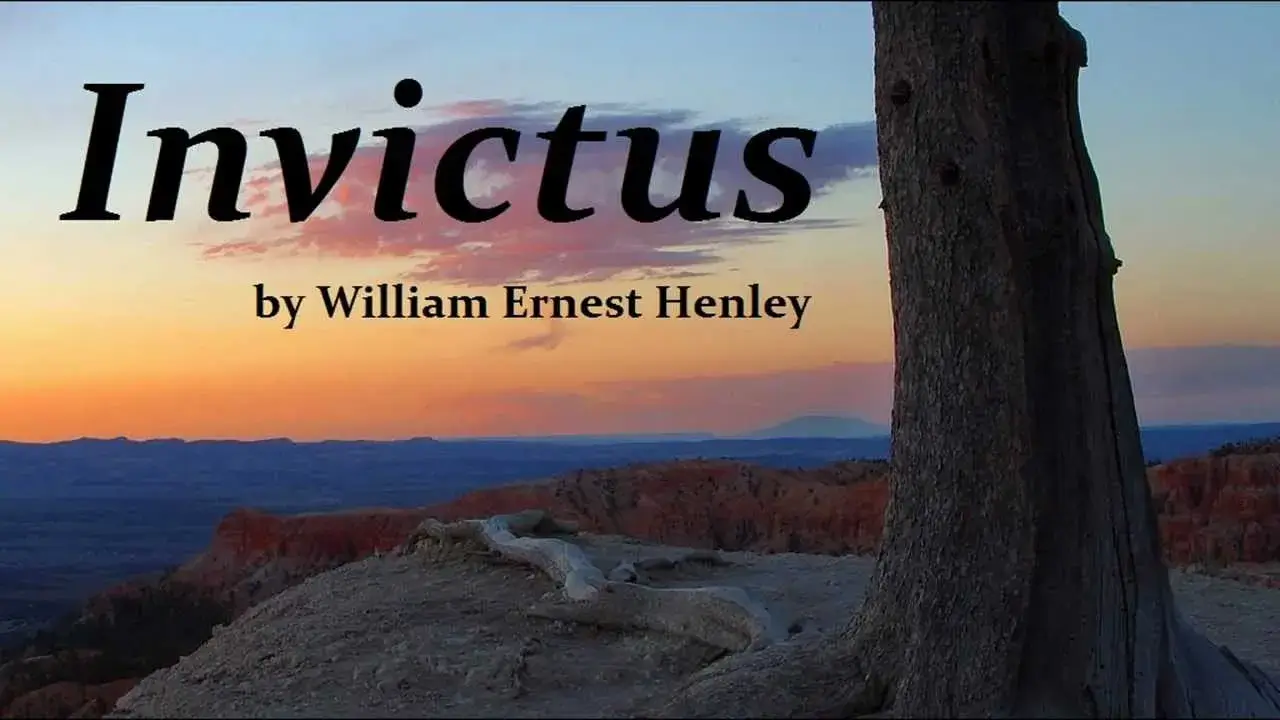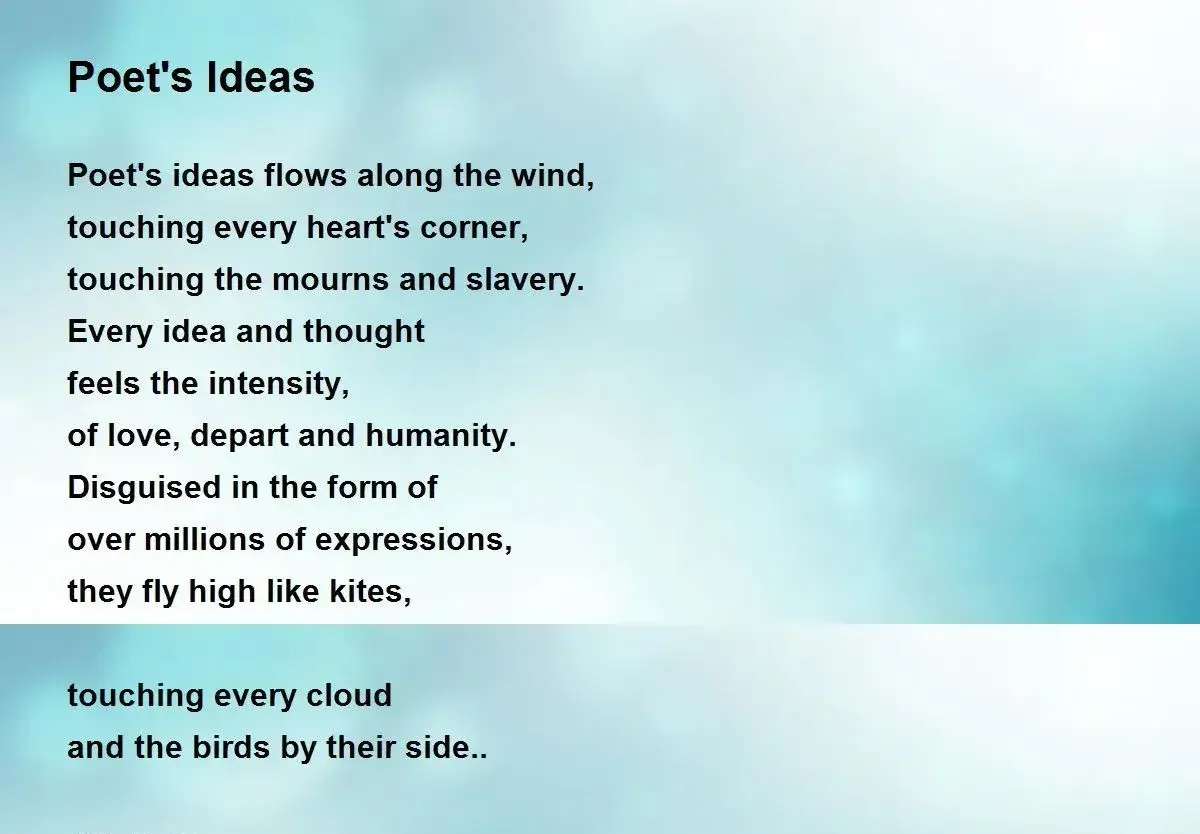
Invictus is a poem which is written by William Ernest Henley is a powerful poem about inner strength and power. The poem speaks about facing the life’s challenges with courage, no matter how difficult they are. The word “invictus” means unconquered and the poem reminds us that even in the darkest moments in our life, we have control over our own spirits. His message is about being the master of your own fate.
To be or not to be is one of the most famous quotes from William Shakespeare’s play “Helmet”. The quote reflects deep philosophical thoughts about existence, the pain of life, and the unknowns of death. Shakespeare uses this speech to explore the complexities of human emotions and the difficulty decisions which people face in the life.
Invictus Poem

[quote]Out of the night that covers me,
Black as the pit from pole to pole,
I thank whatever gods may be
For my unconquerable soul.In the fell clutch of circumstance
I have not winced nor cried aloud.
Under the bludgeonings of chance
My head is bloody, but unbowed.[/quote] [quote]Beyond this place of wrath and tears
Looms but the Horror of the shade,
And yet the menace of the years
Finds and shall find me unafraid.It matters not how strait the gate,
How charged with punishments the scroll,
I am the master of my fate,
I am the captain of my soul.[/quote]
[quote] I am the Reaper.
All things with heedful hook
Silent I gather.
Pale roses touched with the spring,
Tall corn in summer,
Fruits rich with autumn, and frail winter blossoms—
Reaping, still reaping—
All things with heedful hook
Timely I gather.I am the Sower.
All the unbodied life
Runs through my seed-sheet.
Atom with atom wed,
Each quickening the other,
Fall through my hands, ever changing, still changeless.
Ceaselessly sowing,
Life, incorruptible life,
Flows from my seed-sheet. [/quote]
[quote]Out of the starless night that covers me,
(O tribulation of the wind that rolls!)
Black as the cloud of some tremendous spell,
The susurration of the sighing sea
Sounds like the sobbing whisper of two souls
That tremble in a passion of farewell.To the desires that trebled life in me,
(O melancholy of the wind that rolls!)
The dreams that seemed the future to foretell,
The hopes that mounted herward like the sea,
To all the sweet things sent on happy souls,
I cannot choose but bid a mute farewell.And to the girl who was so much to me
(O lamentation of this wind that rolls!)
Since I may not the life of her compel,
Out of the night, beside the sounding sea,
Full of the love that might have blent our souls,
A sad, a last, a long, supreme farewell. [/quote]
[quote] Out of the night that covers me,
Black as the pit from pole to pole,
I thank whatever gods may be
For my unconquerable soul.
In the fell clutch of circumstance
I have not winced nor cried aloud.
Under the bludgeonings of chance
My head is bloody, but unbowed.Beyond this place of wrath and tears
Looms but the horror of the shade,
And yet the menace of the years
Finds and shall find me unafraid.[/quote]
Read More: Free Poems and If We Must Die Poem for Inspiration
Invictus Type of Poem

Passed, and your face, your golden face is gray –
I think, what’er the end, this dream of mine,
Comforting you, a friendly star will shine
Down the dim slope where you still stumble and stray.
So may it be: that so dead yesterday,
Not sad-eyed ghost but generous and gay,
May serve your memories like almighty wine,
When you are old!
Dear Heart, it shall be so. Under the sway
Of death the past’s enormous disarray
Lies hushed and dark. Yet though there come no sign,
Live on well pleased: immortal and divine
Love shall still tend you, as God’s angels may,
When you are old. [/quote]
[quote] Between the dusk of a summer night
And the dawn of a summer day,
We caught at a mood as it passed in flight,
And we bade it stoop and stay.
And what with the dawn of night began
With the dusk of day was done;
For that is the way of woman and man,
When a hazard has made them one.
Arc upon arc, from shade to shine,
The World went thundering free;
And what was his errand but hers and mine —
The lords of him, I and she?
O, it’s die we must, but it’s live we can,
And the marvel of earth and sun
Is all for the joy of woman and man
And the longing that makes them one.[/quote]
[quote] the quiet skies:
And from the west,
Where the sun, his day’s work ended,
Lingers as in content,
There falls on the old, gray city
An influence luminous and serene,
A shining peace.
The smoke ascends
In a rosy-and-golden haze. The spires
Shine and are changed. In the valley
Shadows rise. The lark sings on. The sun,
Closing his benediction,
Sinks, and the darkening air
Thrills with a sense of the triumphing night—
Night with her train of stars
And her great gift of sleep.[/quote]
[quote]The ways of Death are soothing and serene,
And all the words of Death are grave and sweet.
From camp and church, the fireside and the street,
She beckons forth – and strife and song have been.
A summer night descending cool and green
And dark on daytime’s dust and stress and heat,
The ways of death are soothing and serene,
And all the words of Death are grave and sweet.
O, glad and sorrowful, with triumphant mien
And radiant faces, look upon and greet
This last of all your lovers, and to meet
The kiss, the Comforter’s, your spirit lean ….
The ways of Death are soothing and serene.[/quote]
[quote]A dainty thing’s the Villanelle.
Sly, musical, a jewel in rhyme,
It serves its purpose passing well.
A doublc-clappered silver bell
That must be made to clink in chime,
A dainty thing’s the Villanelle;
And if you wish to flute a spell,
Or ask a meeting ‘neath the lime,
It serves its purpose passing well.
You must not ask of it the swell
Of organs grandiose and sublime-
A dainty thing’s the Villanelle; [/quote]
Read More: Short and Heartfelt Love Poems for Her and Him
To Be Or To Be Not

Whether ’tis nobler in the mind to suffer
The slings and arrows of outrageous fortune,
Or to take arms against a sea of troubles
And by opposing end them. To die—to sleep,
No more; and by a sleep to say we end
The heart-ache and the thousand natural shocks
That flesh is heir to: ’tis a consummation
Devoutly to be wish’d. To die, to sleep;
To sleep, perchance to dream—ay, there’s the rub:
For in that sleep of death what dreams may come,
When we have shuffled off this mortal coil,
Must give us pause—there’s the respect
That makes calamity of so long life.[/quote] [quote]For who would bear the whips and scorns of time,
Th’oppressor’s wrong, the proud man’s contumely,
The pangs of dispriz’d love, the law’s delay,
The insolence of office, and the spurns
That patient merit of th’unworthy takes,
When he himself might his quietus make
With a bare bodkin? Who would fardels bear,
To grunt and sweat under a weary life,
But that the dread of something after death,
The undiscovere’d country, from whose bourn
No traveller returns, puzzles the will,
And makes us rather bear those ills we have
Than fly to others that we know not of?[/quote] [quote]Thus conscience doth make cowards of us all,
And thus the native hue of resolution
Is sicklied o’er with the pale cast of thought,
And enterprises of great pith and moment
With this regard their currents turn awry
And lose the name of action.[/quote]
Read More: Shel Silverstein Poems from Where the Sidewalk Ends
Ideas for Poems

I love thee to the depth and breadth and height
My soul can reach, when feeling out of sight
For the ends of Being and ideal Grace.
I love thee to the level of every day’s
Most quiet need, by sun and candlelight.
I love thee freely, as men strive for Right;
I love thee purely, as they turn from Praise.
I love with a passion put to use
In my old griefs, and with my childhood’s faith.
I love thee with a love I seemed to lose
With my lost saints, – I love thee with the breath,
Smiles, tears, of all my life! – and, if God choose,
I shall but love thee better after death.[/quote] [quote]Her arms semaphore fat triangles,
Pudgy hands bunched on layered hips
Where bones idle under years of fatback
And lima beans.
Her jowls shiver in accusation
Of crimes clichéd by
Repetition. Her children, strangers
To childhood’s toys, play
Best the games of darkened doorways,
Rooftop tag, and know the slick feel of
Other people’s property.
Too fat to whore,
Too mad to work,
Searches her dreams for the
Lucky sign and walks bare-handed
Into a den of bureaucrats for
Her portion.
‘They don’t give me welfare.
I take it.'[/quote]
[quote]I am: yet what I am none cares or knows,
My friends forsake me like a memory lost;
I am the self-consumer of my woes,
They rise and vanish in oblivious host,
Like shades in love and death’s oblivion lost;
And yet I am! and live with shadows tost
Into the nothingness of scorn and noise,
Into the living sea of waking dreams,
Where there is neither sense of life nor joys,
But the vast shipwreck of my life’s esteems;
And e’en the dearest- that I loved the best-
Are strange- nay, rather stranger than the rest.
I long for scenes where man has never trod;
A place where woman never smil’d or wept;
There to abide with my creator, God,
And sleep as I in childhood sweetly slept:
Untroubling and untroubled where I lie;
The grass below- above the vaulted sky.[/quote]
[quote]Lost in the forest, I broke off a dark twig
and lifted its whisper to my thirsty lips:
maybe it was the voice of the rain crying,
a cracked bell, or a torn heart.
Something from far off it seemed
deep and secret to me, hidden by the earth,
a shout muffled by huge autumns,
by the moist half-open darkness of the leaves.
Wakening from the dreaming forest there, the hazel-sprig
sang under my tongue, its drifting fragrance
climbed up through my conscious mind
as if suddenly the roots I had left behind
cried out to me, the land I had lost with my childhood—
and I stopped, wounded by the wandering scent. [/quote]
Read More: Poems About Love After Lockup



